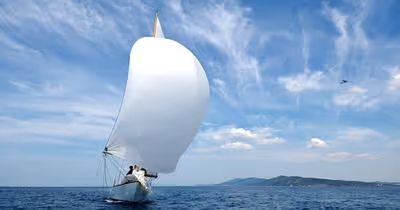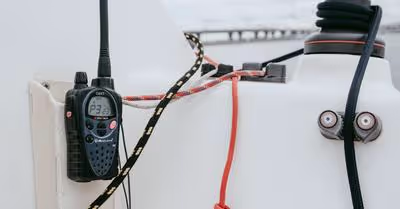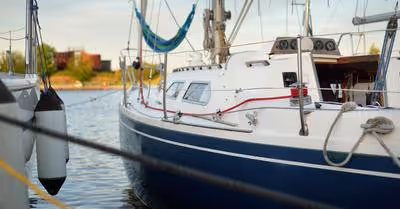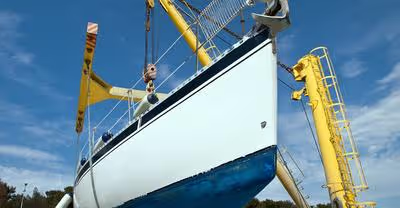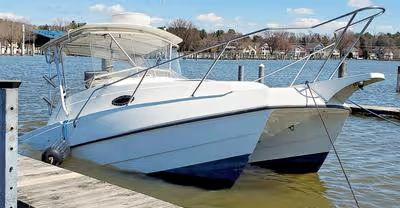Table of Contents
Yachting and Sailing
Is there a distinction to be made between boating, yachting, and sailing? The answer is, yes. The use of a boat on the water is referred to as "boating." There are many different types of boats, such as sailboats for sailing and yachts for boating, living, and fishing.
Yachting
The act of riding, navigating, cruising, or racing on the water aboard a yacht, as stated above, is known as yachting. The majority of the time, this will be for recreational objectives, such as leisure or enjoyment. Basically, yachting is when you are out on the water in a yacht.
Sailing
A sailboat is a type of boat that has a sail as part of its design. Sailboats may travel across water because the wind pushes the huge sail forward, propelling the whole boat ahead. A sailboat is effortlessly recognized by its triangular-shaped sail and big mast, as well as its plain exterior.
Yachts are bigger, have more capabilities, and can be driven by an engine, whereas sailboats are smaller. The act of guiding or propelling a sailboat forward by the wind that applies a force to its sail is known as sailing. Cruising and racing are the two styles of sailing.
Cruising is more prevalent than racing because sailing is primarily a pleasure activity. Cruising is simply gliding across the water with your sailboat, whereas racing (such as in the Olympics) is more aggressive and only performed by skilled sailors. Sailing isn't easy, but can be learned fairly quickly if you're well taught in the right conditions, such as light winds and calm sea.
Boating
Boating is described as the leisure activity of traveling via water on a boat. Since there are so many distinct sorts of boats, each type of boat has its own set of boating activities. Going yachting or sailing are examples of boating. Plus, several types of water activities, such as parasailing are considered part of the boating experience.
Yachting Vs Sailing – The Differences
Size
When it comes to buying a boat, size matters. Don’t let anyone convince you otherwise. The variation in size between a yacht and a sailboat is one of the most significant factors that strike a difference. A sailboat will almost definitely be smaller in size than a yacht. Of course, some sailboats are bigger than others, but when we speak about average size, a yacht will always be bigger.
You must consider the size of the boat (whether you’re getting a yacht or a sailboat) due to the limitation of available space. The larger your boat is, the more space you'll have. This may seem apparent, but it is one of the most critical aspects of a boat that most individuals forget to pay attention to.
Almost everything you do, every day, will be influenced by the size of your boat. The smaller your boat, the less space you have for yourself and for your emergency supplies. Every inch and nook of space matters when it comes to boats; although your height also plays a crucial role. For instance, if you’re 6 feet tall and you purchase a small-sized sailboat, you won’t have enough room to sleep on your boat because of less space. You may not realize it immediately, but you'll be in serious trouble. You might even be able to convince yourself that curling up into a ball is good when you're trying to sleep, but this isn't going to last long and is also not recommended.
Furthermore, size matters the most when there are more individuals on the sailboat or yacht. However, if you intend to live alone, you will have plenty of space available for yourself. You'll need the same gear whether you have one person or several, such as a fishing rod, a first-aid kit, food storage, watermaker, and so forth. So, for instance, if there are three persons on board, you won't need three first aid kits. All of this implies that the sleeping or resting space is the most important difference between living with people and living alone.
Although if you plan on living on your sailboat with someone (a friend or your partner), room is even more important. That’s because both individuals should be able to move around freely and just because your little boat can accommodate two individuals, it doesn't imply you can live happily on it. If there are more than two people on board, a yacht might be a better option.
Price
The yachts will, for the most part, be more expensive. Occasionally, much more expensive than an ordinary sailboat for several reasons, the most important of which are material and technology. A yacht that is more modern and technologically advanced is likely to be more expensive. Although this is not always the case, it is mostly true. If money is a key factor in choosing which boat to buy, here's something to think about: just because a yacht is more costly doesn't mean you shouldn't own one. When in doubt, it's almost always better to spend the extra cash on something bigger and better.
It is not uncommon to purchase a home with the intention of renovating it. Making minor repairs and upgrades as needed, including the construction of an extension in some situations. This does not apply to boats. The boat you purchase is the boat you will receive. Sure, it could be better. It will be upgraded, restored, and repainted, although it will largely remain the same size.
The process of buying a boat is similar to that of purchasing a car. You wouldn't buy a little hatchback and then use it to create a new car altogether. You will be stuck with the size car you purchase in the first place. Similarly, you’ll be stuck with the same sized boat you purchase. You'll need another boat if you require extra space. Buying one costly boat rather than having to buy a second, somewhat less expensive boat because the first wasn't up to par will save you money in the long term.
Crew
The extent to which the team will influence your choice is mostly determined on your budget and the size of the vessel you are considering. If you intend to buy a sailboat, you won't need (or want) any form of team, except for your friends and family that live on your yacht with you. However, if you own a yacht, the situation is quite different. If you wish to live on your yacht, you might need the support of one or two team members. There will be too much to do even if you are the most essential member of the team (like a team captain). It's possible that engineering, maintenance, and navigation aren't your strong suits.
If you want to acquire a sailboat, you may take care of everything yourself. There will be few computer mechanisms that require repair, and you are unlikely to have an engine. Maintaining or repairing a sailboat isn't straightforward per se; it's just easier for one person to handle. A sail is more convenient to replace than an engine. In bad weather conditions, a small sailboat is just easier to keep an eye on than a big yacht. At the very least, you may require another set of eyes on a yacht to keep a check on everything.
The presence or absence of a sail
For the most part, the distinction of whether or not a sail is present is merely for aesthetic reasons. However, a sailboat will always have a sail (hence, its name). The sail is what propels the vessel onward by harnessing the wind. So long as the weather conditions permit, sailing can be done anywhere, at any time.
Yachting, conversely, has its own set of limitations. A yacht usually lacks a sail, which can be viewed as a positive or negative depending on your perspective. If you're searching for a vessel that's easier to handle, a yacht might be a better option. Sure, the computer components are more complicated, and there is more to manage, but navigating and maneuvering will be simpler.
In stormy weather, running a sail can be tricky because it won’t be possible to manage the sail while sitting inside the cabin. You can, on the other hand, operate your yacht from the luxury of your cabin.
The benefit of having a sail over merely an engine is that you won't have to be tensed about running out of energy. Fuel is not only inconvenient, but also very costly. When on long journeys, you must at all times watch over the fuel levels, or else you will be at risk of breaking down at sea. A sailboat can sail as long as there is wind. You should be alright if you have an extra sail onboard in spite of what happens. You have a considerably lower possibility of becoming stranded at sea.
Engine capacity
There are motors aboard some sailboats, albeit modest ones. It could be as small as a trolling motor or as large as a two-stroke engine. No matter what engine size you have, it will never be your major source of power. If you have sails, you can harness the wind for power. You have less to think about if your engine is smaller in size and capacity. You'll probably be fine if you only have the most basic mechanical knowledge and skills.
On the other hand, a yacht is a completely different story. If you don't know how to work in the engine room of your yacht and it breaks down, you're in big danger. In this way, buying a yacht is significantly more complex than owning a sailboat. If you don't want to learn how to handle these repairs yourself, you'll have to hire someone to do them for you. It's pointless to rely on a local mechanic or the marina workshop if you're at sea because they won't be able to reach you. Plus, it will be quite expensive to hire a staff member with strong mechanical knowledge and expertise. It is an ongoing cost that you should consider when choosing whether or not a yacht is good for you.
Where can they sail
If you plan on sailing in areas with shallow, shale-filled seas, a sailboat is the way to go. Large yachts; however, cannot sail in shallow waters. In a yacht, the Caribbean, for example, might be difficult to navigate. At the very least, it'll be more complicated than sailing. A sailboat, on the other hand, may cover more distances and travel to far more places than a yacht.
A small sailboat might supposedly sail across the Atlantic. Would you, however, want to? It's quite risky, and your vessel might not be able to endure the strong waves and gushes of winds. Furthermore, if you are sailing, you may be the lone crew member. This means that if the most awful thing happens, far out at sea, there will be no one to aid you. Although it is possible to sail across the Atlantic, you shouldn't take the risk, especially if you’re sailing alone.
Innovation
It is not just technology that should be taken into consideration when you choose a sailboat or a yacht. It's also vital to consider how old each vessel is. A sailboat that is older may not be as high tech as one that is brand new. If you do decide to purchase a boat, improved technology and innovation may serve multiple advantages that an older version can’t. To begin with, it can make working on your yacht much more suitable. There's no rationale you couldn't work remotely from your yacht if you have the possibility of putting up a completely functional office with wifi.
Content
Material considerations are significant, whether they affect the cost or durability. Metals, carbon fiber, and fiberglass, such as titanium will be used to construct a boat. In contrast, a sailboat will most likely be composed of wood or fiberglass. A yacht will be considerably safer for you if safety and sturdiness are your top priorities and cost is not an issue. A sailboat, on the other hand, might fit your aesthetic preferences. You might prefer a wooden sailboat because you think it looks nicer.
The material can also influence how simple it is to perform repairs. A wooden yacht is much easier to mend than a metal boat. You can construct some quick fixes using wood, and they'll probably hold up until you get to port. Moreover, major repairs on a boat will require a lot of specialized equipment and training. Conversely, on a yacht, you may need to engage a crew member to help you with this process.
Recent Articles




